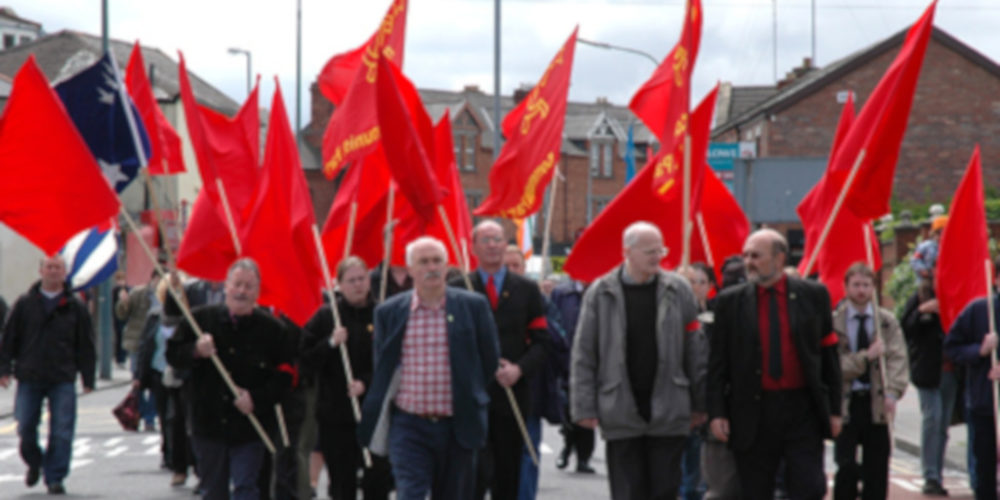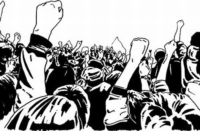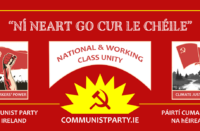As we enter a new decade, the real living conditions of working people continue to decline; profits are up, which means exploitation is intensifying; large numbers of working families rely on family income supplement—the state’s subsidy on behalf of low-pay employers—to survive.
One in ten workers earns only the national minimum wage (€9.80 per hour, going up to €10.10 per hour in February). Nearly a quarter earn less than the “living wage” (€11.90 per hour).
The exploitation of workers, and disproportionately part-time, immigrant, female and young workers, is most intense in the accommodation industry. Food service workers experience the lowest average hourly earnings (€12.70), as this is the least unionised sector, followed by those in the arts, entertainment, recreation, and other services (€16.71). There is also a trend towards low pay in the public sector.
While within the European Union in general the unemployment rate has dropped, this masks a growing level of poverty, particularly among low-paid workers. Governments took full advantage of the economic crisis to roll back hard-won social gains, while “social safety nets” were attacked and have subsequently not kept pace with the cost of living and new employment structures. There are growing signs of a new crisis within the capitalist system.
In the EU in 2017, 9½ per cent of workers lived in a household that was at risk of poverty (earning less than 60 per cent of the national median income). The situation for workers in the United States is even more precarious, with a quarter earning less than two-thirds of the country’s median earnings in 2017, and 18 per cent of the people at risk of poverty in 2018, despite an official unemployment rate of only 4 per cent that year. Some estimates put a figure of $6 billion paid in government food assistance to workers who are in full-time employment.
Britain claims to have virtually full employment; but after decades of austerity policies by both Conservative and Labour governments the incidence of rough sleeping rose by 165 per cent between 2010 and 2018, and the country has 2,000 food banks—compared with 29 before the latest crisis. The minimum wage is insufficient, as it is usually set at a rate to support one person, not enough to support a single-wage family. It is designed to support someone with a full-time job, and in today’s world of work such jobs are diminishing.
In Spain, 91 per cent of employment contracts in the first half of 2018 were temporary, with 38 per cent lasting less than one month. In the United States, half of all new jobs created were eliminated within the first year.
In the EU, 16 per cent of those on temporary contracts and 15½ per cent of those in part-time employment are among the working poor. So much for “social Europe”!
A recent report revealed that the self-employed are at even higher risk, with 22 per cent in working poverty. Many are “independent contractors,” which is often a way for companies to use their workers without having to put them on the books as employees and having to provide the accompanying benefits (sickness, holiday pay, or pensions).
In Ireland, one in five renters is spending 40 per cent of their income on rent, one in ten is spending 60 per cent, and one in twenty is spending 75 per cent.
12½ per cent of the population of the 26 Counties, or 611,982 people, were living in substandard conditions in 2017. In Greece, where EU-imposed austerity has devastated working people, they can spend up to 72 per cent of monthly income on housing.
The cost of child care for working parents in Ireland is over a fifth of their monthly net pay—four times the proportion paid by families in Sweden.
Financially, the level of difficulty in making ends meet is still higher in Ireland, as well as in Croatia, France, Greece, Italy, Slovakia, and Spain, than it was before the economic crisis in 2007. Simply put, there are too many weeks in the month for the wage to cover.
We need a more radical trade union response to the growing exploitation of workers. The old ways of doing things have clearly failed. The movement must become more radical or become even more redundant in the eyes of hundreds of thousands of workers.
What is clearly needed is to organise the majority of workers who are unorganised and to reorganise those already organised. We need to abandon the “service model” of how workers are now organised and rebuild grass-roots organising. It has been done in the past; and life teaches us that there are no solutions to the problems workers face without being better organised than the bosses.
The first step would be the repeal of all anti-worker laws in the whole country. In the 26 Counties this requires the repeal of the Industrial Relations Act (1990). Workers must have the right to join a union, and have that right recognised by their bosses, in that a union must be allowed to represent its members against their bosses.
We need to build a vibrant Workers’ Rights Campaign throughout the trade union movement and among the unorganised. Low pay and poor terms and working conditions undermine all workers and only strengthen the hands both of private employers and of the state as an employer.
Around the world we see tens of millions of workers mobilising to change their material conditions—in Chile, Lebanon, Iraq, France, India, Britain, and Ireland. Workers have had enough of the decades of austerity. But so far we have not been able to provide a clear path to the destination where these struggles need to go.
As the Italian communist Antonio Gramsci wrote, “the crisis consists precisely in the fact that the old is dying and the new cannot be born; in this interregnum a great variety of morbid symptoms appear.” This is very appropriate to the situation being experienced today not only here in Ireland but throughout the capitalist world.
The capitalist system has passed its historical sell-by date. It is poisoning our planet and poisoning human relations by promoting fascism, racism, sexism, and homophobia.
Make the next decade a decade of rebuilding and the rebirth of a more militant working-class movement, a more militant and thereby more relevant trade union movement, and a stronger and more militant world communist movement.
And we start at home by building a stronger Communist Party of Ireland.






